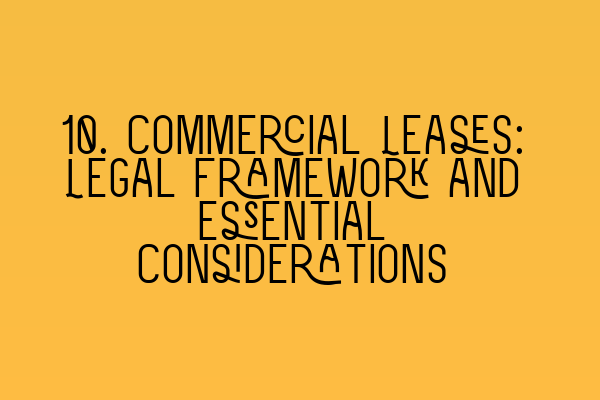10. Commercial Leases: Legal Framework and Essential Considerations
Introduction
Commercial leases are an integral part of the business landscape. As a solicitor specializing in property law and land law at SQE Property Law & Land Law, I have encountered numerous commercial lease agreements and helped clients navigate the complex legal framework that governs them. In this blog post, we will explore the legal framework surrounding commercial leases and highlight the essential considerations for both landlords and tenants.
Before delving into the intricacies of commercial leases, it is important to note that obtaining legal advice from a qualified solicitor is crucial for ensuring compliance with the law and protecting your rights. At SQE Property Law & Land Law, our team of experts is well-versed in commercial lease matters and can provide you with the guidance you need.
1. What is a Commercial Lease?
A commercial lease is a legally binding contractual agreement between a landlord and a tenant for the rental of commercial property. This property may include retail spaces, office buildings, industrial units, or any other premises used for business purposes. Commercial leases often involve long-term commitments, typically spanning several years.
2. Legal Framework
The legal framework governing commercial leases in the United Kingdom is primarily derived from common law principles, statutes, and case law. The key legislation governing commercial leases includes the Landlord and Tenant Act 1954, the Land Registration Act 2002, the Landlord and Tenant (Covenants) Act 1995, and the Law of Property Act 1925.
The Landlord and Tenant Act 1954, in particular, provides statutory protection to tenants by granting them security of tenure, meaning that tenants have the right to renew their lease at the end of the contractual term. Landlords, however, may seek to terminate a lease if certain grounds for eviction can be established.
3. Essential Considerations for Landlords
If you are a landlord considering entering into a commercial lease agreement, there are several essential considerations you should keep in mind.
a. Rent and Rent Review: Setting an appropriate rent is crucial for both parties involved. Landlords must determine a fair market rent for the property and include provisions for rent review during the lease term.
b. Repair and Maintenance: Establishing responsibilities for repair and maintenance is vital to prevent disputes. Clearly outlining obligations in the lease agreement will help avoid conflicts down the line.
c. Alienation: Consider whether you would grant your tenant the right to assign the lease, sublet the premises, or share occupation with others. It’s important to carefully assess the tenant’s qualifications and suitability for your property.
For a more comprehensive understanding of the essential considerations for landlords, visit our article on SQE 1 Practice Exam Questions.
4. Essential Considerations for Tenants
As a tenant considering entering into a commercial lease agreement, there are several essential considerations you should be aware of.
a. Lease Term: Assess the length of the lease term and whether it aligns with your business goals and objectives. Negotiating a longer lease term may provide stability, but it also means a more significant commitment.
b. Break Clauses: Check if the lease includes break clauses that allow for early termination. These clauses can be beneficial if circumstances change or if the business needs to relocate.
c. Repair Obligations: Understand your responsibilities regarding repair and maintenance of the premises. Negotiating favorable repair clauses can save you from unexpected expenses.
For a more comprehensive understanding of the essential considerations for tenants, visit our article on SQE 1 Practice Mocks FLK1 FLK2.
5. Additional Considerations
In addition to the essential considerations outlined above, there are several other factors to be mindful of when entering into a commercial lease agreement. These include:
a. Service Charges and Insurance: Understand the terms pertaining to service charges and insurance, and how they may affect your financial obligations.
b. Use Restrictions: Ensure that the permitted use of the premises aligns with your business requirements and any future expansion plans.
c. Dilapidations: Familiarize yourself with the rules surrounding dilapidations, which refer to the repairs required at the end of the lease term. Understanding your obligations in this regard can help you avoid disputes and significant costs.
For a deeper dive into these additional considerations, visit our article on SQE 2 Preparation Courses.
Conclusion
Navigating the legal framework surrounding commercial leases can be complex, but with the right guidance and understanding of the essential considerations, landlords and tenants can enter into agreements that protect their interests and promote a mutually beneficial relationship.
At SQE Property Law & Land Law, we specialize in providing expert advice and support for all matters related to commercial leases. Whether you are a landlord or a tenant, our team of experienced solicitors can guide you through the process, ensuring compliance with the law and safeguarding your rights.
For more information on commercial leases and other property law-related topics, explore our range of articles on SQE 1 Preparation Courses.
Remember, when it comes to commercial leases, obtaining professional legal advice is crucial to ensure a smooth and successful outcome.
To stay updated on SRA SQE exam dates and other important information, visit our article on SRA SQE Exam Dates.
